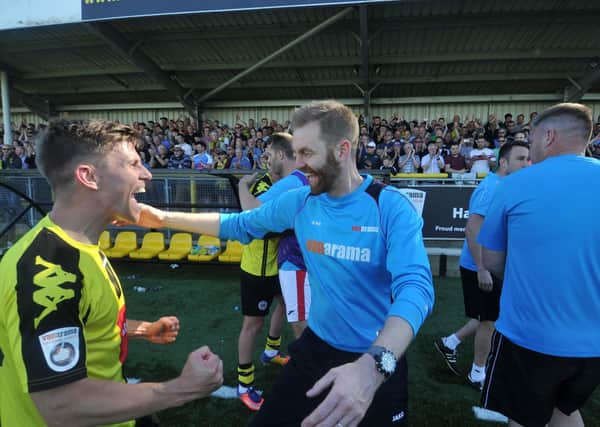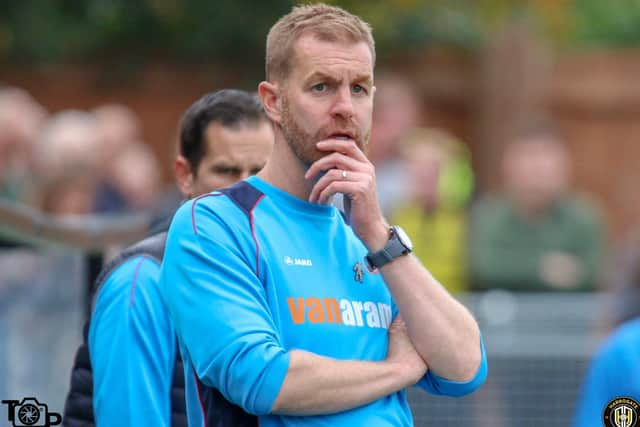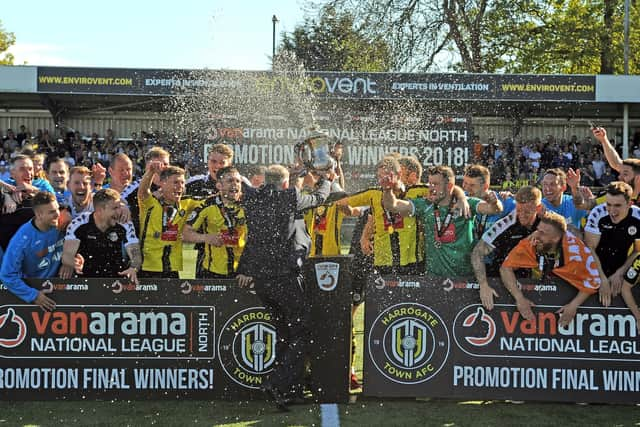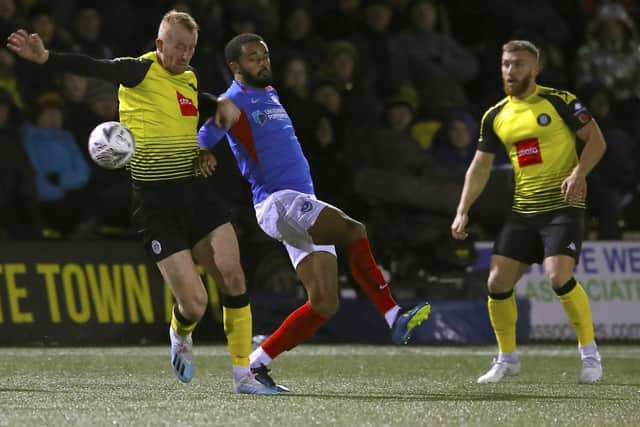Fighting qualities see Simon Weaver stick around for long haul at Harrogate Town


The game, as the cliche goes, is very much a results business and it has become increasingly uncommon in recent years to see the man at the helm permitted much of an opportunity to turn things around once a team begins to struggle.
Indeed, statistics released by the League Managers’ Association at the end of the 2017-18 season revealed that the average tenure of members dismissed from their posts that term was just 1.16 years.
Advertisement
Hide AdAdvertisement
Hide AdThere are, of course, exceptions to the rule, but football clubs willing to give managers the chance to build something over an extended period are few and far between these days.


Anyone interested in what it is actually possible to achieve when presented with such an opportunity should look no further than Harrogate Town boss Simon Weaver, currently the longest-serving manager in English professional football.
Now into his 11th season in charge of the Wetherby Road outfit, he has overseen a significant transformation and led the club to within touching distance of the Football League, though the 42-year-old didn’t make his mark overnight.
Weaver was just 31 and had no prior coaching or managerial experience when he was appointed by former Leeds United supremo Bill Fotherby.
Advertisement
Hide AdAdvertisement
Hide AdAt the time, Harrogate boasted just seven season-ticket holders, a squad comprising the sum total of no players and were so lacking in facilities and resources that they were sometimes forced to train in a car park.


Constrained by a limited wage budget and with all of the aforementioned issues to contend with, it should come as no great surprise that Weaver’s reign as Town boss did not begin particularly well.
The club finished 2009-10 bottom of Conference North, only avoiding relegation due to Farsley Celtic’s resignation and the expulsion of Northwich Victoria.
Weaver has admitted since that he expected to be sacked as a result of his team’s poor showing that season, but he has gone on to make the most of the fact that the late Fotherby opted to persevere with his rookie boss.
Advertisement
Hide AdAdvertisement
Hide AdThere have been plenty of ups and downs since that initial reprieve, though the last three years have brought only progress.


Their first-ever season as a fully professional outfit saw Harrogate promoted from National League North behind 2017-18 champions Salford City.
A National League play-off berth was then secured as the club’s maiden outing in English football’s fifth tier ended with them in sixth place.
This term, they were second in the table, just four points behind leaders Barrow when competition was suspended due to the coronavirus outbreak.
Advertisement
Hide AdAdvertisement
Hide AdNaturally, Weaver has learned a huge amount during the last decade, too much to quantify he says, but he believes that not compromising on playing style ranks among the most important decisions he took early on.
“I played under a long-ball manager in Keith Alexander, a footballing manager in Brian Horton and had a lot of different styles in my head when I first started out,” he revealed.
“Initially, it was about survival, and I had to do a lot of chopping and changing in the early days just to try and get the best out of what I had because we didn’t have enough quality.
“But I really wanted my team to reflect values that I think are important – effort, attitude and honesty – and to play football that is exciting to watch.
Advertisement
Hide AdAdvertisement
Hide Ad“Once I was clear about what I wanted to do, it was a case of learning the process of how to deliver it, something that is still a work in progress.”
There is, however, so much more to succeeding in management than simply getting your tactics right, and Weaver concedes that he has learned plenty from his mistakes.
“I was so raw when I started out and sometimes I look back and cringe,” he addded.
“I remember going away to FC United of Manchester and beating them in front of a full house. It was a great result, but it was absolutely pouring down and I was stood at the side of the pitch in a full suit looking like a drowned rat.
Advertisement
Hide AdAdvertisement
Hide Ad“I had all my best gear on because I was worried about how I was portrayed. It just wasn’t me, and I’ve learned that people will see you as they see you.
“I also came to realise that when you’re building a team, the character of the players is every bit as important as how good they are.
“We had some lads who came down the levels to sign for us who maybe thought they’d been there and done it and lacked energy and desire, or were just in it for themselves.
“You can be set up at a club to help players thrive, but it’s very hard to change someone’s character. If you’re signing good people then I’m confident that they can go on and develop.”
Advertisement
Hide AdAdvertisement
Hide AdOne thing that has remained consistent from the word go is Weaver’s approach to man-management, something which he believes is key to maintaining harmony within a group.
“I’ve always tried to be honest with the players,” he added.
“If someone’s not in the team then I’ll speak to them one-to-one and try to explain why.
“You can never appease everyone because all the lads want to be playing, but I think that it’s important to try and be open and honest.
Advertisement
Hide AdAdvertisement
Hide Ad“Hopefully that has earned me some respect over the last decade.”
As he approaches his 11th year in the Town hot-seat, Weaver concedes that many will attribute his long tenure to the fact that his father, Irving Weaver, bought the club and took over as chairman in 2011, but he doesn’t believe that he has ever been the beneficiary of nepotism.
“A lot of people will point to the father-son relationship, however I’ve always said that this situation brings its own pressure,” he said, speaking shortly after his 10th anniversary in charge.
“I don’t want to be the guy letting him down and letting the club down.I don’t want to put my dad in that position.
Advertisement
Hide AdAdvertisement
Hide Ad“He knows that I’m a young manager and I’ve made mistakes, but hopefully I’ve learned from them. He also knows that I’m a scrapper and a fighter and I think those qualities have helped me become one of a number of people who have taken this club forwards and equipped it to go on.”
Comment Guidelines
National World encourages reader discussion on our stories. User feedback, insights and back-and-forth exchanges add a rich layer of context to reporting. Please review our Community Guidelines before commenting.